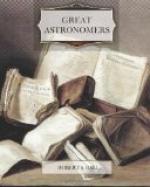Like many another philosopher who has greatly extended our knowledge of nature, Galileo had a remarkable aptitude for the invention of instruments designed for philosophical research. To facilitate his practical work, we find that in 1599 he had engaged a skilled workman who was to live in his house, and thus be constantly at hand to try the devices for ever springing from Galileo’s fertile brain. Among the earliest of his inventions appears to have been the thermometer, which he constructed in 1602. No doubt this apparatus in its primitive form differed in some respects from the contrivance we call by the same name. Galileo at first employed water as the agent, by the expansion of which the temperature was to be measured. He afterwards saw the advantage of using spirits for the same purpose. It was not until about half a century later that mercury came to be recognised as the liquid most generally suitable for the thermometer.
The time was now approaching when Galileo was to make that mighty step in the advancement of human knowledge which followed on the application of the telescope to astronomy. As to how his idea of such an instrument originated, we had best let him tell us in his own words. The passage is given in a letter which he writes to his brother-in-law, Landucci.
“I write now because I have a piece of news for you, though whether you will be glad or sorry to hear it I cannot say; for I have now no hope of returning to my own country, though the occurrence which has destroyed that hope has had results both useful and honourable. You must know, then, that two months ago there was a report spread here that in Flanders some one had presented to Count Maurice of Nassau a glass manufactured in such a way as to make distant objects appear very near, so that a man at the distance of two miles could be clearly seen. This seemed to me so marvellous that I began to think about it. As it appeared to me to have a foundation in the Theory of Perspective, I set about contriving how to make it, and at length I found out, and have succeeded so well that the one I have made is far superior to the Dutch telescope. It was reported in Venice that I had made one, and a week since I was commanded to show it to his Serenity and to all the members of the senate, to their infinite amazement. Many gentlemen and senators, even the oldest, have ascended at various times the highest bell-towers in Venice to spy out ships at sea making sail for the mouth of the harbour, and have seen them clearly, though without my telescope they would have been invisible for more than two hours. The effect of this instrument is to show an object at a distance of say fifty miles, as if it were but five miles.”
The remarkable properties of the telescope at once commanded universal attention among intellectual men. Galileo received applications from several quarters for his new instrument, of which it would seem that he manufactured a large number to be distributed as gifts to various illustrious personages.




